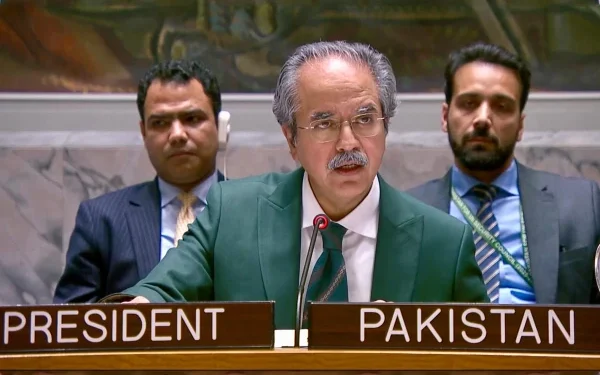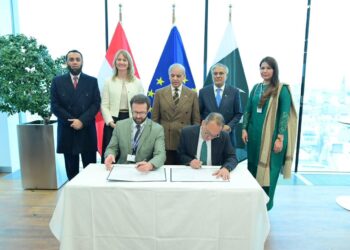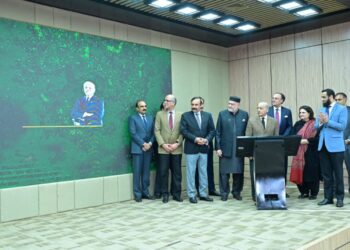ISLAMABAD — In a strong and unequivocal statement at the United Nations, Pakistan has condemned Israel’s ongoing military aggression against Syria, denouncing it as irresponsible, dangerous, and a deliberate attempt to destabilize the Middle East. During a special briefing of the UN Security Council on the situation in Syria, Pakistan’s Permanent Representative to the United Nations and current President of the Security Council, Ambassador Asim Iftikhar Ahmed, delivered a national statement calling for immediate international attention and action.
Pakistan’s Firm Stance: A Call for Sovereignty and Stability
Representing Pakistan at the United Nations, Ambassador Asim Iftikhar Ahmed voiced grave concerns over Israel’s consistent and escalating attacks on sovereign Syrian territory. Pakistan emphasized that these military actions constitute blatant violations of international law, the UN Charter, and several binding UN Security Council resolutions.
“Israel’s repeated violations are a sign of recklessness,” the Ambassador stated. “The failure of the international community to hold Israel accountable has further exacerbated these actions, undermining global order based on the UN Charter and the principles of international law.”
He pointed to the 1974 Disengagement of Forces Agreement and called for its full respect, reiterating that Syrian sovereignty and territorial integrity must not be violated under any circumstances.
Israel’s Regional Aggression: Gaza, Lebanon, Syria, Iran, Yemen
In his speech, Ambassador Ahmed expanded the scope of Israel’s regional actions, stating that Israeli military interventions are not confined to Syria.
“Whether it is Gaza, Lebanon, Syria, Iran, or Yemen, Israel is acting outside the bounds of international law,” he noted.
These actions, he said, violate Article 2(4) of the UN Charter, which prohibits the use of force and enshrines the principle of state sovereignty and non-interference in the internal affairs of member states.
The Ambassador emphasized that this growing pattern of impunity, if left unchecked, poses a grave threat to regional peace and global stability.
Syria at a Crossroads: Transitioning Toward Peace and Reconstruction
Ambassador Ahmed highlighted that Syria, after more than a decade of devastating civil conflict, is currently undergoing a fragile but significant transitional phase. The Syrian people, according to him, are beginning to experience a renewed sense of hope, marked by diplomatic re-engagement, economic sanctions relief, and nascent reconstruction efforts.
“There are clear signs of re-establishment of relations at political and economic levels. Major sanctions have been lifted, which has provided relief to the Syrian economy, and slow but steady progress is being made toward national reconstruction.”
He underscored that Syria’s leadership has shown intent to mend ties, not just internally but also with regional and international partners. This moment of diplomatic openness, he warned, is being undermined by Israeli airstrikes targeting Syrian state institutions and infrastructure.
Destabilizing Peace Efforts: Impact of Israeli Airstrikes on Syria
Pakistan views the Israeli attacks on Syrian state institutions as not only irrational but also dangerously counterproductive.
“At a time when Syria is striving to rebuild and reconcile, Israel’s continued aggression undermines national institutions, halts development, and derails efforts to achieve lasting peace.”
These strikes are seen as direct interference in Syria’s internal affairs—a violation not just of legal norms but also of the international consensus around Syrian sovereignty and post-war recovery.
Ambassador Ahmed stated that solidarity, not sabotage, is what Syria needs right now. He urged the global community to recognize that sustainable peace can only be achieved by supporting internal cohesion, ethnic inclusivity, and political reconciliation.
Warning of Broader Consequences: A Security Vacuum and Extremism
Pakistan’s statement went beyond moral condemnation, offering a sobering warning about the regional implications of continued Israeli aggression. The Ambassador cautioned that weakening Syria’s central authority through external attacks could lead to the reemergence of terrorist groups in the region.
“Undermining Syria’s sovereignty creates a dangerous security vacuum,” he said. “Such conditions could lead to the resurgence of terrorist and extremist groups, posing a threat not only to Syria but to the entire region and, indeed, the wider world.”
This warning reflects Pakistan’s broader regional security concerns, especially given its own history of battling extremism in neighboring regions such as Afghanistan.
UN Resolution 2254 and the Path to Reconciliation
Ambassador Ahmed made multiple references to UN Security Council Resolution 2254, which outlines a political framework for a peaceful resolution of the Syrian crisis. The resolution emphasizes:
- A Syrian-led and Syrian-owned political transition
- The importance of ceasefire agreements
- Support for a united, inclusive, and democratic Syria
“Promoting internal harmony, cohesion, and inclusion—embracing Syria’s multicultural society—is the only way to advance reconciliation and ensure nationwide stability,” he reiterated.
He added that external interference, particularly Israel’s, directly undermines these efforts and violates the spirit of Resolution 2254.
Pakistan’s Broader Foreign Policy: Upholding International Law
Pakistan’s condemnation of Israel is consistent with its foreign policy stance on Palestine, Syria, and broader Middle Eastern issues. Islamabad has long advocated for compliance with international law, the principles of non-aggression, and respect for state sovereignty.
As a member of the United Nations and the Organization of Islamic Cooperation (OIC), Pakistan frequently calls for global action against injustices in the Muslim world. Its statement at the UN Security Council reflects a continuation of this principled diplomacy.
Pakistan Urges the International Community to Take Action
In conclusion, Pakistan’s envoy made a strong appeal to the international community, particularly the UN Security Council, to act decisively in defense of international law and human dignity.
“Israel’s actions are not only illegal but ultimately self-defeating, as they create the very instability they claim to avoid,” he said. “Syria needs space and support for reform, rehabilitation, and national reconstruction.”
He stressed the need for multilateral cooperation to ensure regional peace and called on the Security Council to uphold its responsibility to maintain international peace and security.
Pakistan’s Solidarity With the Syrian People
Closing his statement, Ambassador Asim Iftikhar Ahmed reaffirmed Pakistan’s unwavering support for Syria’s sovereignty, unity, and territorial integrity.
“At this critical juncture, Pakistan expresses its full solidarity with the Syrian people,” he concluded, reflecting a sentiment that aligns with the broader Muslim world’s opposition to foreign intervention in Syria.
Conclusion: A Critical Moment for Middle Eastern Stability
As Syria stands on the brink of a potentially historic recovery, Pakistan’s warning to the United Nations carries urgency and weight. The message is clear: peace and reconciliation in Syria cannot be achieved in the presence of continued foreign aggression. The international community must choose between enabling destabilization through silence or fostering stability through decisive diplomatic action.
Pakistan’s intervention at the UN serves not only as a voice for Syria, but also as a call for global accountability in the face of repeated violations of international law.

























